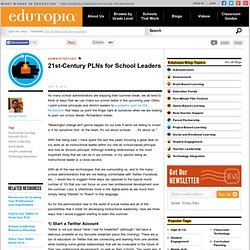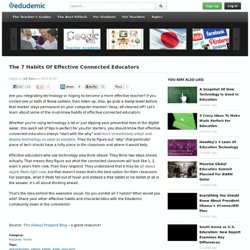

Social Learning Connections. District Level Examples. Education » Sustainable Learning. Sustainable Learning. Www.groups-that-work.com/GTWedit/GTW/lurkerprojectcopworkshopspring03rev.pdf. 21st-Century PLNs for School Leaders. As many school administrators are enjoying their summer break, we all tend to think of ways that we can make our school better in the upcoming year.

Often, I point school principals and district leaders to a powerful post by Will Richardson that helps us point the finger right at ourselves when we are looking to push our school ahead. Richardson states: "Meaningful change ain't gonna happen for our kids if we're not willing to invest in it for ourselves first. At the heart, it's not about schools . . . it's about us. " With that being said, I have spent the last few years focusing a great deal on my work as an instructional leader within my role as school-based principal, and now as division principal.
So for the administrator new to the world of social media and all of the possibilities that it holds for developing instructional leadership, here are three ways that I would suggest starting to learn this summer 1) Start a Twitter Account "Go the way, know the way, show the way. " Conclusion. Richard Byrne Presents. Knowledge management. Communities Manifesto. Online Communities of Practice. 16. Community of Practice. Community of practice. Community A community of practice (CoP) is a group of people who "share a concern or a passion for something they do and learn how to do it better as they interact regularly".[1] The concept was first proposed by cognitive anthropologist Jean Lave and educational theorist Etienne Wenger in their 1991 book Situated Learning (Lave & Wenger 1991).

Wenger then significantly expanded on the concept in his 1998 book Communities of Practice (Wenger 1998). A CoP can evolve naturally because of the members' common interest in a particular domain or area, or it can be created deliberately with the goal of gaining knowledge related to a specific field. Practice based communities.
Toolkits & Guides. 10 Simple Ways To Build Your Personal Learning Network. Getting online is easy. Finding a few resources is relatively easy. Finding useful (and real) people who can truly benefit your learning is quite difficult. That’s probably why there is such a big need for teachers, administrators, and even students to have a personal learning network (PLN). Whether it’s strictly online or a mixture of both in-person and online is not important. Whatever works best for you is what works best. With that in mind, I decided to offer up a few tips for anyone looking to build or enhance a PLN .
Below is a listing of what you see in the visual in case you’re looking for the text version. 1. 2. 3. 4. 5. 6. 7. 8. 9. 10. The 7 Habits Of Effective Connected Educators. Are you integrating technology or hoping to become a more effective teacher?

If you circled one or both of those options, then listen up. Also, go grab a damp towel before that marker stays permanent on your computer monitor! Okay, all cleaned off? Let’s learn about some of the must-know habits of effective connected educators. Whether you’re using technology a lot or just dipping your proverbial toes in the digital water, this quick set of tips is perfect for you.For starters, you should know that effective connected educators always “start with the why” and don’t immediately adopt and deploy technology as soon as possible . Effective educators who use technology also think ahead. That’s the idea behind this awesome visual. Source: The Always Prepped Blog – a great resource!
What Real Collaboration Between Teachers and Techies Looks Like. This is what edtech should be: teachers, administrators, and even students, and edupreneurs participating in the same conversation.

On Thursday, July 11, hundreds of teachers and administrators from public, private and charter schools from the Chicago region spent a day of their free time learning more about the 30 edtech startups and trying out their products. The beautiful, light-filled Harold Washington Library, imbued with a long history of spreading knowledge for all, provided the perfect backdrop for these lively interactions. The brainchild of Eileen Murphy, former teacher, curriculum developer, and district-level administrator for Chicago Public Schools and now founder and CEO of ThinkCERCA, the Education Technology Startup Collaborative User Conference facilitated many informal interactions among tech-savvy educators and startup teams building the tools.
Discussions are already underway for similar events to be held in the SF Bay Area and in Baltimore. AJ Jacobs: The Importance of Self-Delusion in the Creative Process. About this presentation How can we apply the idea of method acting to our business lives?

This is the question that lifehacker and bestselling author AJ Jacobs tackles in this insightful (and highly entertaining) talk on the benefits of faking it until you make it. Through a series of examples from his own life, Jacobs shows just how much our behavior shapes our thoughts and our perceptions. Thus, if we want to change our attitude about something, the best way is to “act as if.” Strengthening connected online communities of practice in education.
Spidergram Poster 2013. Learning registry for Connected Educators.